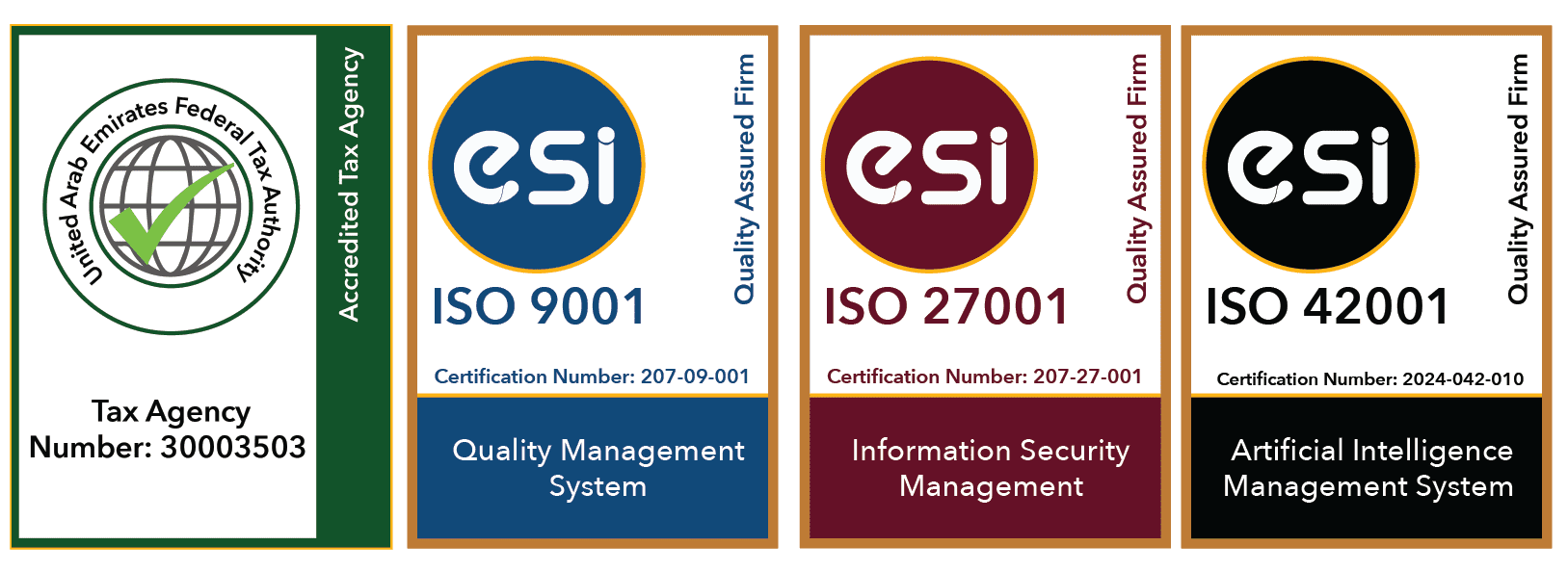UAE Corporate Tax – Immediate Actions & Guide For Businesses
01 Jan, 2025 / Haroon Juma / Corporate Tax

With the introduction of the Federal Decree-Law No. 47 of 2022 on the Taxation of Corporations and Businesses, the UAE ushered in significant changes in the tax landscape. The change presents major considerations for the UAE business’ approach to managing its obligations and ensure accurate compliance.
In this guide, we will explore the key steps businesses should take to prepare for potential corporate taxes in the UAE.
Register For Corporate Tax
Under Federal Tax Authority Decision No. 3 of 2024, effective from 1 March 2024, the FTA published deadlines for all businesses and taxable persons to register. The registration applies to all businesses (juridical persons) holding a trade license. The deadlines are staggered to allow FTA to properly assess applicants in a timely manner.
|
Date of Licence issuance irrespective of year of issuance |
Deadline for submitting a Tax Registration application |
| 1 January – 31 January | 31 May 2024 |
| 1 February – 28/29 February | 31 May 2024 |
| 1 March – 31 March | 30 June 2024 |
| 1 April – 30 April | 30 June 2024 |
| 1 May – 31 May | 31 July 2024 |
| 1 June – 30 June | 31 August 2024 |
| 1 July – 31 July | 30 September 2024 |
| 1 August – 31 August | 31 October 2024 |
| 1 September – 30 September | 31 October 2024 |
| 1 October – 31 October | 30 November 2024 |
| 1 November – 30 November | 30 November 2024 |
| 1 December – 31 December | 31 December 2024 |
|
Where a person does not have a License at the effective date of this Decision |
(3) three months from the effective date of this Decision |
An administrative penalty of AED10,000 for late registration will be imposed on businesses that do not submit their Corporate Tax registration applications within the timelines
Understanding the Current Landscape
Staying informed is paramount. To begin your preparations, start by gathering the latest information. The current legislation published on 9 December 2022 was a clear confirmation of the introduction of Corporate Tax. The initial Legislation provides a clear framework on the tax principles and approach for UAE Corporate Tax which serves as foundation to understanding the system.
Staying Informed
Regularly monitor updates from the UAE Ministry of Finance and Federal Tax Authority regarding any changes in tax policies. It will be a continuing requirement for several months to monitor updates that clarify or enhance the Legislation. Since the initial UAE Corporate Tax guide has been published a range of Ministerial Decisions and guides have been published detailing clarity to the Legislation.
Official government websites, tax authorities, and legal publications are reliable sources for the latest information. Subscribing to our newsletters or alerts provide timely updates on legislative changes.
Engaging with tax professionals such as SimplySolved who specialize in UAE tax laws is essential. They can offer insights into proposed changes, interpret complex regulations, and provide personalized advice based on your business’s unique circumstances. The Tax Law is very subjective to your business structure and transactions, a tailored understanding can ensure you benefit from specific reliefs and benefits.
Tax Planning & Impact Assessment
The introduction of the UAE corporate tax guide requires your businesses to conduct an assessment of the impact on your legal and financial structure. A range of impacts from transfer pricing and Tax Grouping require assessment to meet the obligations and possible benefits under the Tax Legislation. Tax planning becomes a strategic necessity to align your business goals with the evolving tax landscape.
Working with financial experts to evaluate your current financial structure and identify areas that may be affected by new tax regulations will harness expertise to optimise your tax model. Develop a tax planning strategy not only ensures compliance but also maximizes tax efficiency for your business.
Financial Record Keeping
Your accounting policies and books are especially critical. It is a legal requirement under Cabinet Decision No. (74) of 2023 on the Executive Regulation of Federal Decree-Law No. (28) of 2022 on Tax Procedures to maintain accurate and up-to-date financial records for tax compliance. This extends the obligations under the VAT Tax Procedures Law to a wider set of business record keeping including salaries and stock reporting.
Your business should implement a more robust accounting system to track income, expenses, and other financial transactions. This will not only streamline the tax compliance and preparation process but also provides a clear overview of your business’s financial health.
Ensure that your accounting practices adhere to international IFRS standards and are transparent. If your business is less structured, it is an opportunity to not only simplify tax filing but also serves as a valuable resource for decision-making within your organization.
Assess and Implement Changes in Accounting Systems
Your accounting system plays a pivotal role in managing Tax calculations and compliance. The accounting system will require some key changes which your business must consider.
This can include updating your accounting system or implementing a new accounting system such as Zoho Books which offers native out of the box functionality for the UAE Corporate Tax guide. As a minimum, your accounting system will require Chart of Accounts updates to include new accounts specific to corporate taxes especially for income and expense accounts. The Legislation will require greater identification of deductible expenses to ensure they meet the eligible criteria.
In addition, a good accounting system will allow configurations to automate tax calculations based on the new corporate tax regulations. The notion of “Taxable Income” under UAE Corporate Tax is not “Accounting Profit” determined from your normal accounting profit and loss statements. Taxable income is a specific calculation subject to add backs and adjustments to ensure the applicable tax liability is correctly assessed. Hence, modifications to your chart of accounts are necessary for correct identification in formulating your tax liability.
Compliance
Familiarize yourself with the filing requirements and deadlines associated with corporate taxes. Your business must register irrespective of whether you generate income or profit. Non-compliance can lead to penalties and legal issues.
Seek guidance from professionals to ensure that your business operations align with current and future tax regulations. Regularly review compliance checklists and update your processes accordingly.
Employee & Director Benefits and Payroll
Salaries and payroll are a key consideration for businesses to book as deductible expenses. It is vital to understand the tax implications related to director salaries, employee compensation, benefits, and other remuneration.
Review your payroll processes to ensure compliance with the regulations. If your business does not operate formal payroll or salary policies, this is an area to focus on to ensure it complies to the Law and can be fully deducted. You may need to review adjustments to salary structures, benefits packages, or other forms of employee compensation to align with corporate tax requirements. Salaries deductions require full and complete documentation and basis of calculations for payroll to be deductible.
Transfer Pricing
For businesses with international operations or domestic related entities, transfer pricing regulations become a crucial aspect of tax compliance. The Legislation requires correct pricing treatment (defined under OECD rules) for transactions between related entities to be conducted at arm’s length, adhering to transfer pricing regulations.
Undertake a review of your intercompany transactions and pricing strategies. Implementing robust transfer pricing policies not only ensures compliance with tax laws but also enhances transparency and reduces the risk of disputes with tax authorities.
Legal Structure Review
The legal structure of your business plays a significant role in determining its tax implications. Evaluate your current legal structure to assess its tax efficiency. The UAE Law is especially clear on artificial structuring under the General Anti Abuse Rules and care should be exercised.
Collaborate with experts that optimize your tax position. However, a considered approach can position your business for long-term success in a changing tax environment.
Documentation
The Cabinet Decision No. (74) of 2023 on the Executive Regulation of Federal Decree-Law No. (28) of 2022 on Tax Procedures also specifies a wide set of obligations for documentation retention. You must consider a system of documentation management to maintain detailed records of financial transactions, tax calculations, and any supporting documentation required for audits. Robust documentation not only serves for a confident tax filing but also serves as evidence of your commitment to compliance.
This proactive approach minimizes the risk of errors, streamlines the audit process, and demonstrates your commitment to transparency.
Training and Awareness
Awareness and understanding of your tax operating model is essential. Incorporate tax awareness and training programs for your finance and accounting teams. Ensure that your teams stay updated on the latest tax regulations, compliance requirements, and procedural changes.
Investing in the knowledge and capabilities of your team is essential for maintaining a culture of compliance within your organization.
Conclusion
Preparing for corporate taxes in the UAE requires a planned and multi-dimensional approach. If your business adopts this philosophy, it will provide a foundation to proactively adapt to changes in the tax landscape.
The UAE tax regulations are and will continue to change, and it’s crucial to regularly reassess your strategies and seek updated guidance from professionals in UAE tax laws. By taking a proactive and informed approach, your business can navigate the complexities of corporate taxation.
Accounting & Tax Services
As an approved FTA Tax Agency, SimplySolved supports businesses under advisory or complete outsource basis to optimise, manage and discharge tax obligation in the UAE. Our in-depth understanding can help to Our experts possess in-depth knowledge of the UAE tax regulations and can guide you through the intricacies of the UAE Corporate Tax Law.
By leveraging our expertise, you can streamline the process, saving time and minimizing the risk of errors. This proactive approach ensures that your Tax matter are handled efficiently, allowing you to focus on your core business activities.
Simply Solved is an ISO 9001 & 27001 certified company and a registered FTA Tax Agency. Our team of experienced consultants and tax agents provides high-quality, cost-effective services for all Tax matters for companies of all sizes.

About SimplySolved
At SimplySolved, we save your time, resources, and costs. Whether you need help with Outsourced Accounting, Finance, Corporate Tax, Employee Management & Payroll and ERP & E-Commerce Integration. we have the expertise and solutions to help.
Subscribe to mailing list
Partner With SimplySolved
Serving over 300+ clients we know the challenges your business faces operating cost effective, compliant and efficient back office operations.
As an FTA Accredited Tax Agency with ISO 9001 Quality & 27001 Information Management Certification, we offer a quality-based approach to our services supported by dedicated team of certified professionals.
We support our clients with defined processes, platforms and expertise to deliver advisory, project and outsourced services in Accounting, Tax, Auditing, HRM & Payroll & ERP solutions. Our offerings are specially designed to meet the UAE Regulations to put you in control of your information, comply to the legislation and help you make better business decisions.
Copyright © 2024 | SimplySolved | All Rights Reserved.




